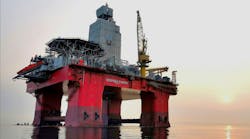Darius V. Snieckus
OGJ Online
LONDON, May 17 -- The European Union and Russian Federation Tuesday will try to advance plans to formalize cooperation and integration of their energy markets when political representatives meet at the EU-Russian Federation Summit in Moscow.
Security of energy supply will top the agenda at the bilateral Energy Dialogue meeting today, followed closely by discussion of how to improve the investment climate in the Federation so as to promote inward industrial investment by EU member states in Russia.
Loyola de Palacio, vice-president for energy and transport at the European Commission, said Tuesday the Energy Dialog with EU and Russia was on track.
"Areas of cooperation have been discussed in an open and pragmatic manner," she said. "It is clear that Russia has been a very reliable energy partner for many years and wishes to enhance that status through closer interdependence, recognizing that their strategy for the future must integrate the wider and increasingly integrated European market."
She said the Russian Federation and the EU had a "mutual interest" in heightening overall energy security due to a common need "to satisfy their increasing demand for energy."
The EU-Russian Energy Dialogue, according to the EC, aims to publish a "synthesis report" this summer identifying a list of topics which have the "potential to swiftly result in firm commitments" to be hammered out under the legally binding framework of a partnership and cooperation agreement.
Among the likely areas of cooperation are: integration of EU and Russian energy policies; greater transparency of energy markets; planning upgrades to Russia's oil and gas transport infrastructure; setting a timetable for regulatory reforms to boost investment in Russia's energy sector; and launching pilot projects in energy efficiency and conservation in Russia.
The EC's earlier Green Paper on Energy Security of Supply highlights that EU reliance on imported energy is expected to climb to 70% from 50% over the next 20-30 years. According to EC data, Russia supplied 21% of EU oil and 41% of its gas imports in 1999.
Russia estimates that it needs 670 billion euros invested in its energy sector by 2020 in order to advance new exploration and development while modernizing its oil and gas infrastructure.
The EU sees its role as "mainly one of a facilitator to improve investment opportunities in the energy sector of the Russian Federation in order to promote technology transfer, upgrade the infrastructure, stimulate the introduction of energy efficient and environmentally friendly technologies, and to enhance energy conservation within Russia."
Commissioners on Tuesday stressed that the Energy Dialogue should not discriminate against "other important geopolitical priorities of the EU" in Central Asia, such as the Caspian region and the Ukraine, in favor of Russia.
At the EU-Russian Summit in October 2000 in Paris, it was agreed to institute a continuing energy dialogue between the EU and the Russia Federation to pave the way for "definition and arrangements" for a strategic energy partnership.
Contact Darius V. Snieckus at [email protected]
